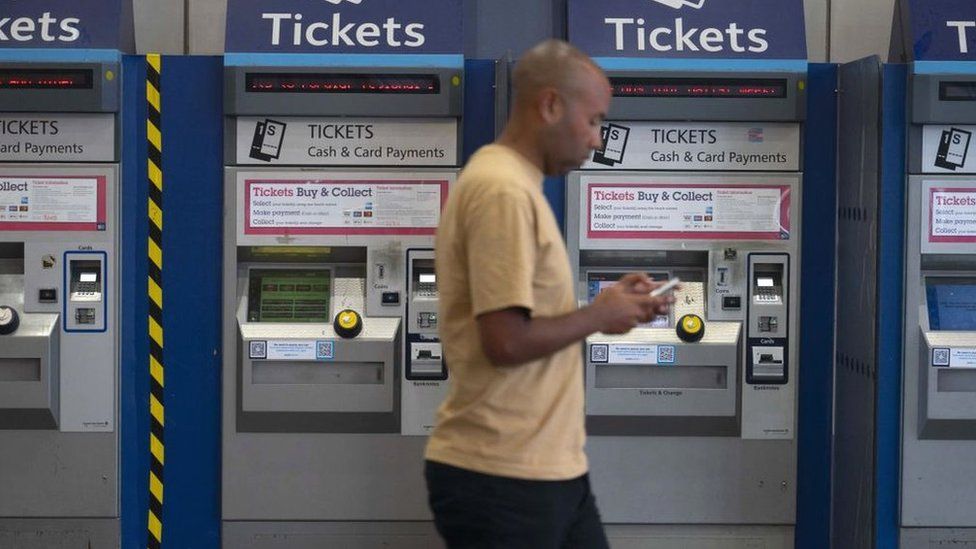7 hours ago
About sharing
Large parts of the country will have no train services on Friday as the latest major strike takes place.
Members of the train drivers’ union Aslef at more than a dozen train companies will walk out on Friday and refuse to work overtime on Saturday.
Up to 20,000 RMT union members at 14 operators will also walk out as part of a long-running dispute on Saturday.
It comes as a consultation on plans to close most ticket offices in England ends.
Passengers are advised to check before they travel. Service levels will vary across England, and some journeys into Scotland and Wales will be affected.
Operators running no services on Friday, 1 September include Northern, Avanti West Coast, Transpennine, Southern and Thameslink.
On Saturday, 2 September, fewer than half of trains will be running, and some services will be subject to short notice cancellation, according to the Rail Delivery Group.
It is likely that evening services on some lines will be affected on the days before each strike, so travellers should plan ahead where possible, it said.
The group, which represents train operators, previously suggested that action was “deliberately designed” to disrupt passengers at the end of their summer holidays.
Workers across 14 different train companies are expected to take part:
Avanti West Coast
c2c
Chiltern Railways
Cross Country Trains
East Midlands Railway
Great Western Railway
Greater Anglia
LNER
Northern Trains
South Eastern
South Western Railway
Transpennine Express
West Midlands Trains
GTR (including Southern, Gatwick Express, Thameslink and Great Northern)
Aslef and the RMT union, which represents other rail workers, have held a series of strikes since last summer which have brought much of the network to a standstill.
Aslef general secretary Mick Whelan said he thought further industrial action was “inevitable”.
“This action is being driven as a reaction to how we’re being treated by employers, how we’re being treated by the government – we have no choice,” he told the BBC.
Aslef is expected to step up its campaign of industrial action in the autumn over pay and proposed changes to working conditions.
Back in the spring, it rejected a two-year offer which would have seen drivers get a backdated pay rise of 4% for 2022 and a 4% increase this year, in exchange for sweeping changes to ways of working.
“[Our members] would much rather be here, fighting for their futures… while seeking a pay rise to put a dent in the cost of living rather than rolling over and having no future at all,” Mr Whelan said.
The RMT also has a mandate to strike until November, but its general secretary Mick Lynch said the union was already preparing to re-ballot workers over further action this autumn and winter.
Unions say any pay offer should reflect the cost of living – with the inflation rate still far above the Bank of England’s target of 2%.
Rail Delivery Group spokesman Robert Nisbet said that the government “made it clear to us we need to cut our cost base” after the pandemic changed passenger habits and left the rail industry with a big hole in its finances.
“We don’t have as many commuters coming back to the railway as we were expecting, but we do have more leisure travellers and more traffic at weekends,” he said.
“That’s why we’re bringing reform and those discussions to the negotiating table and that’s what we want the union to sit down and take seriously.”
The industry and the government – which controls what’s on the table in the dispute – continue to call for unions to put the latest offers to their members in a vote.
A spokesperson for the Department for Transport said: “It’s frustrating to see both Aslef and RMT co-ordinate their strikes with the aim of causing as much disruption as possible on the last weekend of the summer holidays.”
They described offers for workers as “fair and reasonable” and said that industrial action “delays the reforms that would ultimately benefit passengers, rail workers and taxpayers.”
Ticket office closures
Unions and disability groups have also hit out at other proposed changes to ways of working in the industry, such as ticket office closures.
On Friday, a consultation on plans from train companies, which are backed by government, to close many ticket offices will draw to a close.
Currently, nearly 300 stations in England run by train companies with Department for Transport contracts have a full-time staffed ticket office – 708 are staffed part-time. Under the proposals, most would close.
The government-funded watchdog Transport Focus has been collecting public views and industry responses to the proposals before it will decide whether to support or object to the plans.
It looked at issues such as whether stations will continue to be staffed, accessibility, waiting rooms, toilets and how customers struggling to buy a ticket will receive assistance.
Disability campaigner Katie Pennick told BBC Breakfast that the suggested changes were “completely unreasonable” and that people with mobility impairments, for example, could not be expected to “trek up and down platforms” looking for other staff members who might be able to help with ticket purchases.
More than half a million responses to the consultation were submitted.
Some rail experts have argued that the complicated ticketing system should be reformed before ticket office changes are introduced.
Mr Nisbet added that the Rail Delivery Group “wants to carry passengers along with it, especially those with accessibility concerns” and that responses to the consultation would be folded into their plans.
The Department for Transport spokesperson said that no decisions have been made on the future of any ticket office as of yet, “but we have been clear about our responsibility to deliver accessible transport for everyone.”
Related Topics
13 hours ago
